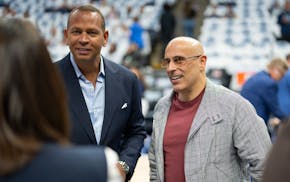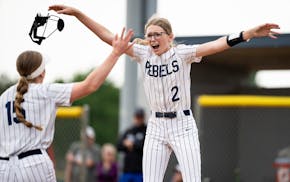Minnesota high school sports leaders are once again confronted with the question of whether transgender student-athletes should be eligible to compete in girls sports.
Leaders of the nonprofit organization that oversees high school athletics in the state are uncertain how President Donald Trump's executive order banning transgender people from participating in girls and women's sports will impact student-athletes. The order, signed Wednesday, is titled "Keeping Men Out of Women's Sports" and declares a person's sex as the gender assigned at birth.
The executive order applies to athletic associations and schools that receive federal funding. Any school found in violation could potentially be ineligible for federal funding.
The Minnesota State High School League administration and its advisers said Thursday the federal order is in direct violation of the equal protection clause of the Minnesota Constitution.
"Students have been allowed to participate consistent with their gender identity in Minnesota for a number of years, based on the [Minnesota] Human Rights Act and the state constitution," MSHSL Executive Director Erich Martens said to the Minnesota Star Tribune.
The executive order gives schools and athletic organizations 60 days to reconstruct a policy to proceed. Roger Aronson, an attorney who is the league's lead lobbyist and legal liaison at the State Capitol, said the league will use that time to decide on a course of action.
"There's work to be done," Aronson said, adding, "We're thankful for the 60 days."
In an email to member schools that was obtained by the Star Tribune, the MSHSL wrote that the league will "continue to review the existing state laws alongside the new presidential executive order and its timeline."
The MSHSL's board of directors in 2015 voted to open girls sports to transgender student-athletes. The decision took effect for the 2015-16 school year. The ruling made Minnesota the 33rd state to adopt a formal transgender student policy.
The Minnesota Constitution "basically does not allow discrimination based on sex or gender identity," Aronson said Friday.
Minnesota is not the only state trying to reconcile existing statues and policies with the executive order President Trump touted as "basic common sense."
"We've seen at least three or four others that had statements out late last evening that similarly says they're following state law, which is where we are," Martens said.
The MSHSL's current bylaw allows participation for all students "consistent with their gender identity or expression in an environment free from discrimination with an equal opportunity for participation in athletics and fine arts."
What determines gender identity is at the heart of the issue, Aronson said. Under Trump's new order, schools and organizations must provide girls and women single-sex sports and single-sex locker rooms, and failing to do so would be a violation of Title IX, which prohibits sexual discrimination in schools.
"Title IX says you can't discriminate on the basis of sex. The question was whether or not that includes gender identity," Aronson said. "We've gone through various phases of 'Yes it does. No it doesn't. Yes it does.' Right now, we're in a 'no it doesn't' phase."
Religious-affiliated private schools are exempt from complying with MSHSL's bylaw. In Minnesota, the process for establishing a transgender student-athlete's eligibility includes written statements from a student's parents or guardians and health care professionals regarding the student's "consistent or sincerely held gender-related identity."
Bruce Howard, director of publications and communications for the National Federation of High School Associations, which writes the rules of competitions for high school sports in the U.S., said the association has "no changes planned at this time relating to yesterday's executive order."
In a statement, the NFHS said the governance of transgender students' participation in high school athletics is handled on a state-by-state basis. "As a result, the NFHS takes no official position on specific transgender rulings. The NFHS does, however, support attempts by member state associations to establish policies that seek to offer competition for all students who wish to be involved in high school sports," the statement read.
The NCAA in 2022 updated its transgender student-athlete participation policy to align with the International Olympic Committee, which permits transgender athletes using a sport-by-sport approach.
On Thursday, however, the NCAA announced its board of governors voted to update its participation policy for transgender athletes to limit competition in women's sports to athletes only assigned female at birth only, while athletes assigned male at birth can only practice with women's teams.
For now, the MSHSL intends to provide guidance and resources to member schools that reach out to the league for direction on the issue.
"We're responding to where we stand in the state at this time, and then ultimately we'll be part of conversations and discussions about where does this go," Martens said.
Resetting Vikings' depth chart, position battles as spring practices begin
Gophers football recruiting tracker: Fleck lands key in-state players

Neal: It's time to see what A-Rod and Marc Lore can do

Champlin Park shuts out Rogers 1-0 to win Class 4A, Section 5 softball title

